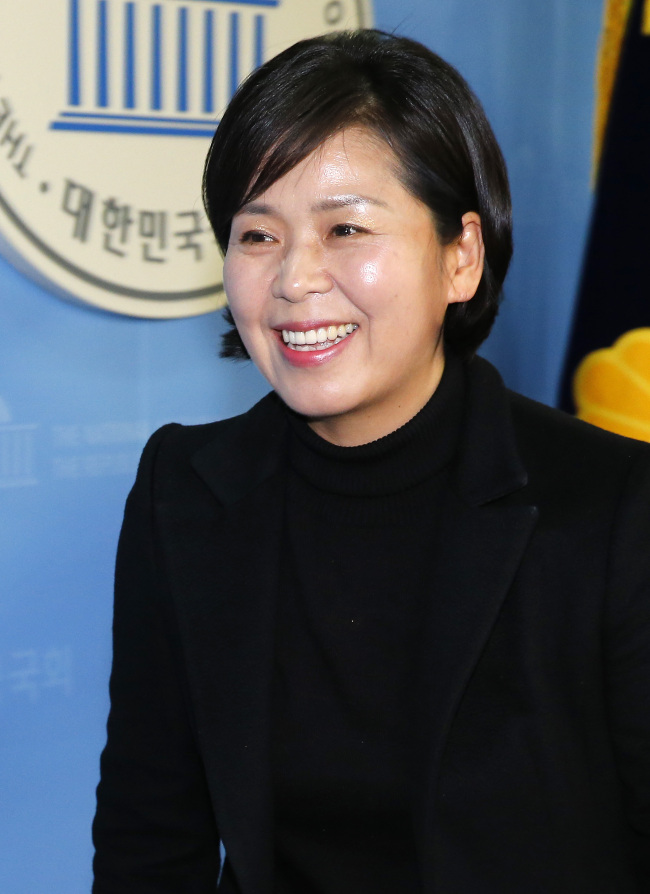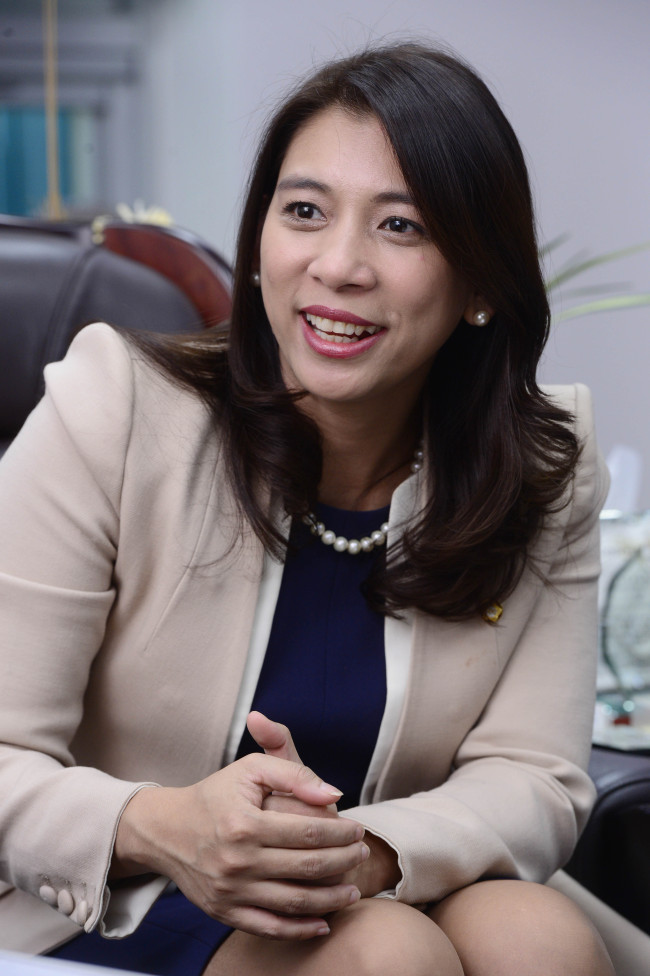[ELECTION 2016] Parties try to add diversity to election rosters
By Yeo Jun-sukPublished : March 1, 2016 - 18:36
South Korea will elect new National Assembly members in a general election on April 13. The Korea Herald is publishing a series of articles on the candidate agendas, election trends and notable runners leading up to the race. This is the fourth installment. -- Ed
When former Samsung Electronics executive Yang Hyang-ja announced in January that she would enter politics as a candidate for the main opposition party, the high-school graduate tried not to hype up her past achievements in breaking the glass ceiling.
“I don’t want to say to those who want to succeed that working like me will bring them success,” said the 49-year-old mother of two children. “We must build a society in which hard work is reciprocated by appropriate rewards and success,” she said. .
Yang, who became the first female executive in the nation’s biggest conglomerate in 2012, is one of the potential candidates aiming to bring diversity to the stereotypical occupation profile of the established parties -- professional politicians with academic or legal backgrounds.
“It is common to see that lawmakers coming from certain professions represent their interests. So it is fair to say that the more diverse the National Assembly becomes, the better it can represent diverse groups’ interest,” said Kim Min-jeon, a political science professor at Kyung Hee University
The National Election Committee’s data shows that out of 300 lawmakers elected in previous 2012 general election, some 70 percent were those that have been making a trade of politics, followed by 8 percent of those with academic background and about 6 percent of those with legal career.
A similar trend is expected to unfold in the upcoming elections. The election watchdog statistics showed last week that among 1,460 potential candidates, some 36 percent were professional politicians, followed by 9 percent and 8 percent of those with legal and academic background, respectively.
The mainstream parties’ incumbents are also heavily lopsided toward members with legal expertise.
Aside from professional politicians, former legal professionals are the most common occupations held by the members of the ruling Saenuri Party and the second most common jobs in the main opposition. The lawyers constituted 15 and 20 percent of the ruling and opposition party, respectively.
“Our party’s chronic problem is that we have so many members with legal backgrounds,” said Rep. Lee No-keun of the Saenuri Party. “I am afraid that it would undermine the party’s efforts to achieve diversity and keep up with changes,” he said.
Favored occupation has also varied slightly among the mainstream parties. While lawyers have been dubbed the most desirable professionals to join the conservative parties, liberal blocs have had their own favorite: civil activists who led the pro-democracy movements.
The National Assembly saw a massive inflow of pro-democracy activists since 1992 when Korea held its general election after toppling the authoritarian government.
The trend reached its peak in 2004 when the late President Roh Moo-hyun was in power. The number of activists who took the seats surged to 70, about seven times as many as those elected in previous elections.
When former Samsung Electronics executive Yang Hyang-ja announced in January that she would enter politics as a candidate for the main opposition party, the high-school graduate tried not to hype up her past achievements in breaking the glass ceiling.
“I don’t want to say to those who want to succeed that working like me will bring them success,” said the 49-year-old mother of two children. “We must build a society in which hard work is reciprocated by appropriate rewards and success,” she said. .
Yang, who became the first female executive in the nation’s biggest conglomerate in 2012, is one of the potential candidates aiming to bring diversity to the stereotypical occupation profile of the established parties -- professional politicians with academic or legal backgrounds.
“It is common to see that lawmakers coming from certain professions represent their interests. So it is fair to say that the more diverse the National Assembly becomes, the better it can represent diverse groups’ interest,” said Kim Min-jeon, a political science professor at Kyung Hee University
The National Election Committee’s data shows that out of 300 lawmakers elected in previous 2012 general election, some 70 percent were those that have been making a trade of politics, followed by 8 percent of those with academic background and about 6 percent of those with legal career.
A similar trend is expected to unfold in the upcoming elections. The election watchdog statistics showed last week that among 1,460 potential candidates, some 36 percent were professional politicians, followed by 9 percent and 8 percent of those with legal and academic background, respectively.
The mainstream parties’ incumbents are also heavily lopsided toward members with legal expertise.
Aside from professional politicians, former legal professionals are the most common occupations held by the members of the ruling Saenuri Party and the second most common jobs in the main opposition. The lawyers constituted 15 and 20 percent of the ruling and opposition party, respectively.
“Our party’s chronic problem is that we have so many members with legal backgrounds,” said Rep. Lee No-keun of the Saenuri Party. “I am afraid that it would undermine the party’s efforts to achieve diversity and keep up with changes,” he said.
Favored occupation has also varied slightly among the mainstream parties. While lawyers have been dubbed the most desirable professionals to join the conservative parties, liberal blocs have had their own favorite: civil activists who led the pro-democracy movements.
The National Assembly saw a massive inflow of pro-democracy activists since 1992 when Korea held its general election after toppling the authoritarian government.
The trend reached its peak in 2004 when the late President Roh Moo-hyun was in power. The number of activists who took the seats surged to 70, about seven times as many as those elected in previous elections.

One of the most common ways to improve diversity is the proportional representative system. In the 2012 elections, 52 were elected through proportional representation and their job profile ranged from poet to naturalized immigrant.
But those with unique backgrounds have struggled to join mainstream politics, mainly because they are first-termers with little say in legislative affairs. The main parties’ regulations mandate that proportional representation seats should only be given to those who have never been elected as a way of providing opportunity to fresh faces.
Some of them, like Rep. Lee Jasmine of the Saenuri Party has constantly faced hurdles of racial and cultural discrimination in Korean politics and society which remains largely exclusive.
Her legislative efforts, such as making laws to protect the education of illegal immigrants’ children have been ostracized by conservatives as an “attempt to help lawbreakers,” with some not hesitating to use insulting slurs against the minority politician.
The parties’ dubious selection process of the proportional representatives have also shed light on the negative aspect of the decades-old system. In the 2008 election, a 30-year-old lawmaker elected through proportional representation lost her seat after being convicted of giving money to then fifth-term lawmaker Seo Chung-won.
“One of the system’s biggest problems is that it fails to bring diversity. When it comes to choosing the candidates, the parties consider political calculations and factional interest, not the expertise the potential lawmakers could bring,” said Hyun Taek-soo, sociology professor at Korea University.
Aware of the challenges, the political parties have been moving to compensate the shortfall with separate recruiting efforts to expand their political spectrum. The Saenuri Party and the Minjoo Party of Korea have lately competed to announce new faces with unique backgrounds.
The Minjoo Party, for instance, recruited political aspirants whose job profile does not traditionally fit with the liberal party. Aside from former Samsung executive Yang, they brought in video company Webzen chairman Kim Byung-kwan and Hanwha Investment & Securities CEO Chu Jin-hyung.
Its recruitment of current interim leader Kim Jong-in, a conservative economist and former campaign strategist for President Park Geun-hye, has also been perceived as the party’s fresh attempt to highlight economy, although the decision was also criticized both in and outside of the party for running counter to its liberal identity.
The Saenuri Party is also trying to recruit high-profile figures to join the race to spruce up its image, although their efforts so far have been mediocre in the face of escalating in-house power struggles over nomination. They include 9-dan professional Go player Cho Hun-hyun, climber Um Hong-gil, and former labor union chief of Ssangyong Motor Kim Kyu-han. All three have reportedly turned the offer down.
“I understand it won’t be easy, but the parties should have a system to train high-profile figures and teach them about politics. Those who are good at their jobs are not necessarily good at politics,” said Yoon Tae-gon, a senior political analyst at Moa Agenda Strategy.

While acknowledging the outreach efforts, experts pointed out that lawyers would continue to be the most sought-after background for those who pursue political career due to their professional expertise and job flexibility.
“Above all, the Assembly is the place where people make laws. The expertise from those with legal backgrounds can be put to a great use when they gather to propose, revise and enact the bills,” the Minjoo Party’s former lawmaker Choe Jae-chun wrote in an op-ed.
Professor Kim Min-jeon noted that the widespread job transition from a legal professional to politician also reflects the reality of the Korean politics.
“In South Korea, it is hard for politicians to return to their jobs if they lose elections. Since lawyers are relatively less worried about losing their livelihood, they are more likely to take the risk and enter politics than other professionals,” said Kim.
By Yeo Jun-suk
(jasonyeo@heraldcorp.com)









![[Graphic News] More Koreans say they plan long-distance trips this year](http://res.heraldm.com/phpwas/restmb_idxmake.php?idx=644&simg=/content/image/2024/04/17/20240417050828_0.gif&u=)
![[KH Explains] Hyundai's full hybrid edge to pay off amid slow transition to pure EVs](http://res.heraldm.com/phpwas/restmb_idxmake.php?idx=644&simg=/content/image/2024/04/18/20240418050645_0.jpg&u=20240419100350)






![[KH Explains] Hyundai's full hybrid edge to pay off amid slow transition to pure EVs](http://res.heraldm.com/phpwas/restmb_idxmake.php?idx=652&simg=/content/image/2024/04/18/20240418050645_0.jpg&u=20240419100350)

